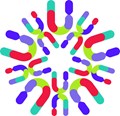Story
Hi, friends, I started this page as I was about run the Boston Marathon in April 2025 for a small UK charity that supports 30,000 families, plus newcomers, around the world, including 10,000 in the USA and 2,000 in Australia, with free expertise that they need desperately but cannot find elsewhere. See www.rarechromo.org. As the support i have received so far has been so wonderful, I've decided to add the greater goal of mine, which is to run the (currently) Seven major marathons that comprise the Abbotts World Marathon Majors series. I've completed London, Berlin, Boston, Sydney and recently, New York. That leaves me Tokyo and Chicago to run in 2026. I already have my entries into them both. Hopefully we can keep this page alive and keep the support going. I promise i will update after each and every event.
In 1990 my sister-in-law, Gillian, gave birth to her first child, a wee sweetie named Lucy who, some said, resembled an alien arrival! “Lulu” had major problems and spent months in hospital with daily interventions and tests to discover why. Eventually, Gill was found to carry a symptomless ‘balanced reciprocal chromosomal translocation’ and, as a result, in the lottery of conception, Lulu had inherited an ‘unbalanced’ form of her mother’s translocation. Lulu’s unique diagnosis is expressed as 46,XX,-10,+der(10)t(5;10)(q35.2;p13)mat and it makes her one of thousands of people affected by a rare – or even unique – chromosome disorder for which there is little insight and no ‘cure’. It’s very isolating to be a “one-off” case.
Note: about one in 500 people worldwide has a balanced reciprocal translocation, the vast majority with no symptoms - but these carriers are at risk of producing offspring with part of one chromosome missing and extra material on another: ‘unbalanced translocations’ leading to miscarriage or the birth of children with symptoms including learning difficulties and physical impairments.
Faced with a diagnosis of unknown impact but potential dire consequences, Gill and her husband, Peter, busied themselves with becoming the “Lulu experts” that medical staff told them they must be to keep their tiny, frail daughter alive and help her thrive as best she could. Within months, a sympathetic geneticist had introduced them to a few families sharing basic information about their own affected children and, from this small pocket of experience, the Rare Chromosome Disorder Support Group, now known as Unique, was born.
These days Unique employs a small specialist team to support tens of thousands of families throughout the world and professionals, including geneticists, who work with them, with clear technical lifetime information on their super-rare genetic conditions. Where possible, Unique puts families and individuals with similar diagnoses in contact with each other, facilitates get-togethers, provides bespoke data for newcomers, runs a ‘listening ear’ helpline, hosts social media forums, welcomes research and advocates, sometimes at government level, for the interests of members.
All services are given free, supported by donations, grants and fundraising. Over the last thirty years there has been an explosion in scientific understanding of genetics and sophisticated diagnostic techniques. Currently funds are being raised for the development of a new Unique database to create a more powerful patient registry, to increase knowledge and respond better and more quickly to the needs of families and professionals.
People are affected by their rare chromosome or single gene disorders in an infinite number of ways, from infertility or repeated miscarriages, through global developmental delay and abnormal patterns of growth, to profound intellectual and other multiple disabilities producing highly complex needs. The tiniest genetic change can have dramatic effects. We will all know someone with a chromosome abnormality – but they may not know it themselves. If/when it comes to affect their life, Unique will be there to ease the shock of diagnosis, interpret obscure results and provide understanding and companionship. It’s a great cause. Please be generous if you can. Cheers!
Footnote: Unique helps with information around diagnosis and key points of development. Lulu’s made it to 34 years. She’s the size of a 7-year-old, a character much loved within her ‘local community’ of London, still lives in the family home with full-time support shared between her parents and PAs/aides, has a busy weekly timetable of specialist activities and “meets and greets” whenever she feels like it. She has pretty frequent seizures and her mother says she still acts like an alien.
Finally, a word about me! I started running at the age of 30 while living in Singapore. I was never fast and working offshore meant I couldn't train consistently but I ran the Singapore marathon 3 times. At the age of 35 I was diagnosed with Ankylosing Spondylitis and stopped all sports activity, spending the next 20 years on painkillers and anti-inflammatory drugs to manage the chronic sciatica and pain. At the age of 55 I was pain free and decided to start running again and committed to running a marathon after I turned 60. Well, New York was number 13 and the 5th of the Majors, with 8 after that 60th birthday milestone. I have been training in my Unique vest proudly. Thank you if you have read this far!!
